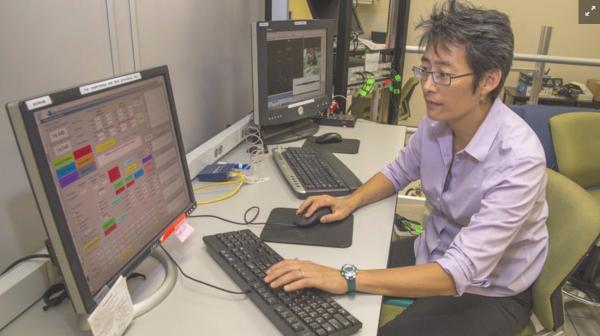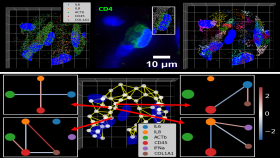Ting works across multiple disciplines to advance mobility.
Lena Ting explores the unanswered questions in her quest to use engineering principles to understand how people move. Her approach integrates research and education in the fields of neuroscience, biomechanics, engineering, rehabilitation, robotics, neurology and physiology, to ultimately benefit those suffering from movement disorders.
“I love that I get to probe interesting and unanswered questions and work at the intersection of a lot of fields,” she said.
Ting says she is not building the better device or machine to advance mobility; she is finding the answers to help others build new technologies to impact people and how they move.
She is changing the way engineers develop technologies for rehabilitation and health care and helping develop autonomous cooperative robots to enhance, assist and improve impairments in gait and balance.
Ting, a professor and educator at the the Department of Rehabilitation Medicine at Emory University School of Medicine and the Wallace H. Coulter Department of Biomedical Engineering at Emory and Georgia Tech, is the 2018 Health Care Hero Award winner in the Allied Health Professional category [by the Atlanta Business Chronicle].
Ting brings a unique blend of science, engineering and robotics to improve rehabilitation for individuals with movement disorders and those who have experienced stroke, spinal cord injury or lower limb loss. Her research focuses on the brain and body interactions that impact walking, standing and balance.
“The way I think about how people move is how I learned about how machines work,” she said. “When a machine breaks down, you find the root cause. You can describe what is happening but you can’t identify the key part that is loose and if I could just tweak it, the symptoms would go away and be resolved. With movement disorders, we have to figure out what causes it.”
“Lena’s research is a perfect example of how biomedical engineering links medicine and engineering to benefit patients,” said Susan Margulies, chair of the Coulter Department of Biomedical Engineering at Georgia Tech and Emory University. “She has made critical discoveries about the connections between signals in the brain and the way our bodies coordinate movement and balance. When injury or disease interrupts these signals, peoples’ lives are impacted very negatively. Technology and engineering can influence these circuits in a positive way.”
Ting has won multiple teaching awards.
“If my research is not fun, I can’t do it well,” she said. “I like to look at problems that are intellectually challenging and come up with new, out-of-the-box ideas — that is exciting to me.”
In one such study, Ting and a Georgia Tech colleague discovered an energy-saving mechanism that helps flamingos balance on one leg while asleep, and that could one day be used to develop novel prosthetic devices. In another, she and her colleagues found that a program called “adapted tango” improved balance-correcting muscle activity that is impaired in people with Parkinson’s disease.
Tonya Layman
Contributing Writer
Atlanta Business Chronicle
Media Contact
Walter Rich
Keywords
Latest BME News
Commercialization program in Coulter BME announces project teams who will receive support to get their research to market.
Courses in the Wallace H. Coulter Department of Biomedical Engineering are being reformatted to incorporate AI and machine learning so students are prepared for a data-driven biotech sector.
Influenced by her mother's journey in engineering, Sriya Surapaneni hopes to inspire other young women in the field.
Coulter BME Professor Earns Tenure, Eyes Future of Innovation in Health and Medicine
The grant will fund the development of cutting-edge technology that could detect colorectal cancer through a simple breath test
The surgical support device landed Coulter BME its 4th consecutive win for the College of Engineering competition.
New research from Georgia Tech helps doctors predict how therapies will interact with a child's immune system, potentially improving outcomes and reducing risks.








